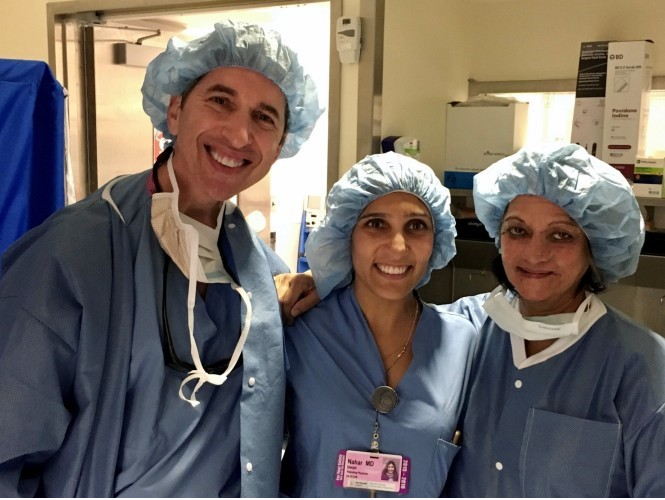“The life so short, the craft so long to learn.” ― Hippocrates (c. 460 – c. 370 BCE)
“In nothing do men more nearly approach the gods than in giving health to men.” ― Cicero (106 – 43 BCE)

Indian & American Robotic Surgeons, North Shore University, New York
Doctors and health
We often link doctors with health. Doctors treat disease. But health is not just absence of disease. It is much more than that. Health is “a state of complete physical, mental, and social well-being and not merely the absence of disease or infirmity.”
Physicians of yore
In olden days doctors offered solace but little cure. But they listened to us attentively, with empathy, and were friendly – and all that contributed to our health. As the medical technology advanced, doctors became more and more able to provide cure, and less and less able to provide health. Today’s doctor has less and less time to listen to us. Today’s doctor uses algorithms, lab tests, diagnostic tools such as MRI, ultrasound, X-ray, to diagnose; and evidence-based medicine and protocols to treat. He has little or no time to understand the patient as a human. An over-busy surgeon, for example, has no time to visit the patient post-surgery; his juniors do.

Hesy-Ra, the earliest recorded physician in the world. “Chief of Dentists and Physicians” to Djoser, the King of Egypt in 27th BCE.
Physicians of Today
Today’s doctor treats the diagnosis, not the patient. If a patient’s medical condition falls outside the algorithm or needs treatment outside the evidence-based medicine, then I, as today’s doctor, am stumped. Because I don’t know the patient because I never listened to him. Because disease is decoupled from the individual. Is it progress, or reductionism or bureaucracy? It is all those things.
Only a few doctors today believe that listening is the key to a patient’s wellbeing. These doctors are the superior ones even if their medical skills are only as good as those of other doctors. Listening is a difficult, time consuming, skill to acquire. And today’s doctor doesn’t have the time or the inclination or the patience to do it. Fewer still of today’s doctors believe that they treat not only with medicines but also with words. A patient has fears and other sentiments that can be assuaged more by doctor’s words than by medicines. Every patient has the right to hope, despite long odds, and it takes more than science to make hope real. It is doctor’s role to help nurture that hope.

Asclepius – a physician and a demigod (Greek mythology).
Physicians’ avant-garde
Medicine, like any other pursuit, but more akin to sports, is a skill that requires time and patience and knowledge to acquire. The more you practice the better you become. And so, a sincere, knowledge thirsty, doctor keeps improving as he ages. A research study in the US showed that an experienced doctor knows the patient’s problem within a minute or so of meeting him. Whereas a young doctor struggles long with his algorithms to come to a decision.
A doctor must be not only knowledgeable and skilled but also quick witted. A surgeon, for example, must react to an emergency with a conditioned response just as does the pilot of a high-performance supersonic fighter jet aircraft.
Physicians and Covid
Doctors and other frontline workers are at the forefront of the battle with Covid pandemic. In India, 798 doctors died in the battle with the second wave of Covid. But they, and other doctors around the world, saved the lives of lakhs of people worldwide.
Prime Minister Narendra Modi spoke for all of us when in his ‘Mann Ki Baat’ he said, “We are all grateful for the contribution of doctors during the Corona period. Our doctors have served us without caring about their lives. Therefore, this time National Doctors’ Day becomes even more special.”
Good physician vs great physician
All this leads me to advise my friends to look for a doctor who is a listener, is empathic and is experienced. And to aim not only to be disease-free but to be healthy. For mental health, have a belief system, a faith; be spiritual; do meditation. For social health, have friends, respect individuals, and accept them for who they are, set aside time for social work, for helping the needy. For physical health, eat healthy, do aerobic and anaerobic exercises, do Yoga, do deep breathing. And above all, be calm, be at peace, be cheerful, be happy. Because a sad soul can be more lethal than a germ.
Medicines cure diseases, but only doctors can cure patients. — Carl Jung
The good physician treats the disease; the great physician treats the patient who has the disease. —William Osler
Today’s Doctor

Dhanvantari – God of Ayurveda, Physician of the Gods (Hindu mythology)